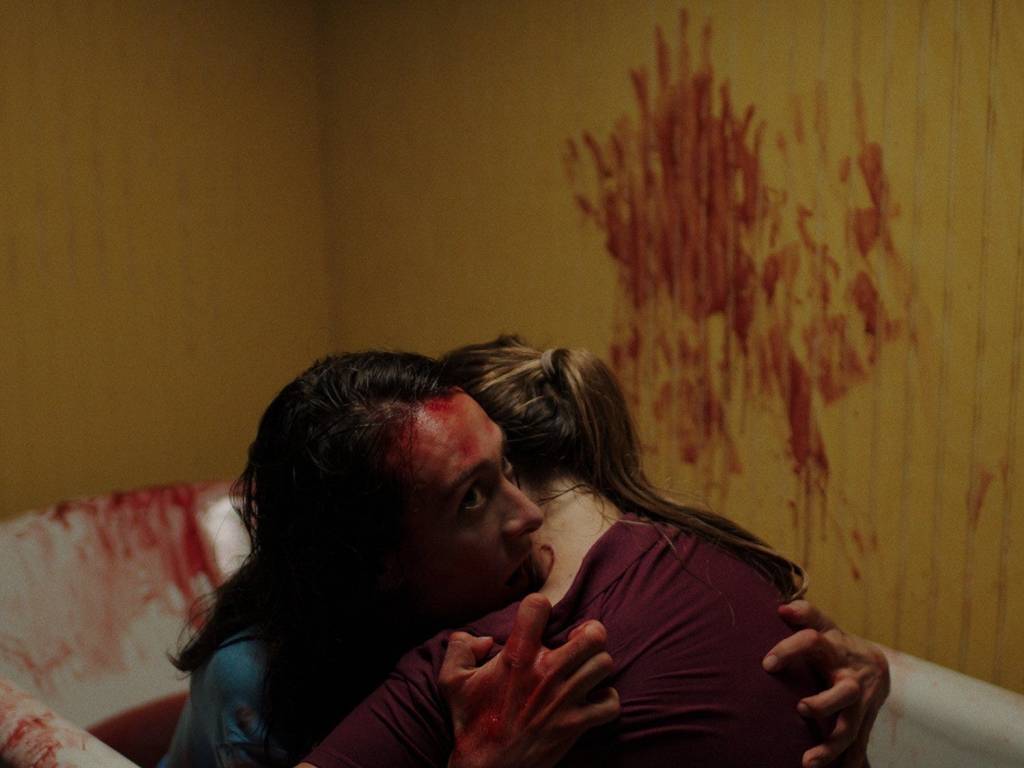In Jonathan Cuertas’ debut feature, everyone’s driven by a hunger to survive

In recent years, horror films have turned their piercing gaze to the ties that bind. From Hereditary to Marrowbone to both versions of We Are What We Are, the toxicity that can seep out of generations of family tradition and protection has proven fertile material for all sorts of nighttime terrors. The idea of family as a refuge from the traumas of the world is subverted into its own nightmarish zone from which there’s no escape–either by circumstance or by blood, you’ll always be a part of the family.
My Heart Can’t Beat Unless You Tell It To, the debut feature by Jonathan Cuartas, is the latest iteration of familial terror, here infusing the dedication of siblings with the insidiously symbiotic relationship akin to the one between Dracula and his helper Renfield. Dwight (Patrick Fugit) and Jessie’s (Ingrid Sophie Schram) lives are devoted to sheltering their weak and reclusive younger brother, Thomas (Owen Campbell). Frail, sickly Thomas is unable to go out during the day and is endlessly hungry for blood–and unable to procure victims of his own, Thomas and Jessie’s days consist of finding new victims and draining them to keep Thomas (and their family unit) alive. Thomas craves a relationship outside of just his brother and sister; Dwight dreams of escaping his family; Jessie thinks of nothing else but keeping them together. When Jessie’s latest catch reveals to be an unexpected tragedy for Dwight, the three siblings’ ties are tested against their more selfish, independent urges.
My Heart Can’t Beat Unless You Tell It To is a fiercely stripped-down and realistic reworking of vampire tales, very much in the vein of George Romero’s Martin or Tomas Alfredson’s Let The Right One In. Its 89-minute runtime refuses any time spent explaining the lore behind Thomas’ condition or the circumstances that drove these siblings into a life of murder and secrecy. Instead, Cuartas is rooted in the immediacy of Dwight, Jessie, and Thomas’ situation, whether it’s pulse-pounding with the tension of chasing an escaped victim or achingly mundane as they bury another body before going to their soul-sucking day jobs. What impact viewers may glean from the film depends on their ability to enjoy the latter as much as the former–as Fugit and Schram pine for something more from their lives amidst the tedium of their occasionally blood-spattered days, I found myself also wanting more from the time spent outside of the gripping sequences of familial tension in their creaky suburban home, or in the bloodcurdlingly methodical sequences of Dwight and Jessie predicting their victims’ next moves with all of the enthusiasm of clocking into a dead-end office job.
That said, patience pays off as the characters’ deliberate emotional detachment from their acts comes into conflict with increasingly personal and chaotic stakes. The few moments where Cuartas plays off of centuries of vampiric cultural knowledge come in Thomas’ undercut attempts to interact with the outside world, notably a life-threatening attempt to toss a message to a neighbor in daylight, one that has rippling consequences for every member of the family. Otherwise, Thomas’ illness is just that–one, that in any other circumstance, would provide the backbone for a heartfelt indie drama as much as a down-and-dirty horror film.
Performances are strong from each sibling, each underplaying their roles with a stoic reserve until they’re forced to reveal their inner conflicts in the heat of a stressful situation. While Fugit and Campbell play fantastically off each other, the film is easily Schram’s–while Thomas may be a literal vampire, it’s Jessie who becomes a cold and calculating Angel of Death, doing whatever it takes to keep her family fed. What’s more, Schram can pivot from brutal to benevolent on a dime, while the same balancing act (by nature) is more difficult for Dwight and Thomas to pull off.
What’s also particularly fascinating about My Heart Can’t Beat Unless You Tell It To is its choice of victims. Vampires throughout Western lore often archetypically embody some sort of anxiety-driving force–but here, Cuertas pays just as much attention to his characters’ choices of who to target. Dwight and Jessie narrow their focus to the homeless, prostitutes, or migrant workers–characters who, like the family struggling with an illness behind closed doors, would more often than not go unheeded by society if they vanished from the face of the Earth. But these victim-hunting sequences give glimmers of exposition into these victims’ circumstances–notably how an escape to America for a better life leads to another fight for survival–lending our central family’s struggle to keep on living another day a deeper, grueling emotional cost. While Thomas is clearly a vampire, the ties that bind family, victim, and perpetrator all share their own similar blood-sucking bond.
My Heart Can’t Beat Unless You Tell It To is now available on Blu-ray and DVD courtesy of MPI Media Group and Dark Sky Films.


